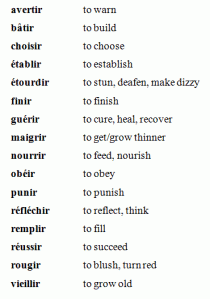Some common, regular -ER verbs:
 Aimer – confusingly, this verb does mean both “to like” and “to love”. Though it usually seems counter-intuitive to us Anglophones, adding the modifier “bien” after the verb actually makes it weaker. So if you want to say you like someone or something and you’re afraid that you’ll be misunderstood, remember:
Aimer – confusingly, this verb does mean both “to like” and “to love”. Though it usually seems counter-intuitive to us Anglophones, adding the modifier “bien” after the verb actually makes it weaker. So if you want to say you like someone or something and you’re afraid that you’ll be misunderstood, remember:
“Je l’aime bien.” (“I like him/her/it.”)
According to Le Petit Robert :
:
Aimer 1. Éprouver de l’affection, de l’amitié, de la tendresse, de la sympathie pour (qqn). (chérir.) 2. Éprouver de l’amour, de la passion pour (qqn). (adorer, idolâtrer.)
Arriver – this is a great little verb and I think you two should be friends, because this little verb will help you sound more “French.”
- “Where are you? You were supposed to be here 15 minutes ago!”
- “I’m coming!”
- “Can you help me? I can’t reach the cereal on the top shelf.”
- “I’m coming!”
We say it every day, in so many everyday situations and the French do too. The only difference is, they don’t use the verb “venir” (“to come”) they use “arriver.” So, the next time someone calls you to tell you you’re late and demand to know where you are, remember:
- “J’arrive !”
(You’ll hear French speakers make the same mistake in reverse and declare “I arrive!” Sounds odd, right? Yup, and that’s how your “je viens” sounds to them.)
Chanter – such a lovely verb, but if you “make” someone do it, you’re blackmailing them. That’s right: “faire chanter” = “to blackmail.” Not sure about the verb “faire” ? It’s irregular, but it’s coming in a future post – il arrive !
Chercher – did you notice the definition? Read it again. Do you see the “for” there? Well, I meant it. So, you “cherchez vos clés” when you are late for work in the morning, you do NOT “cherchez pour vos clés.” No, no, no.
Demander – we’ve already been through this, right? You never “demander pour qqc” in French. However, this verb can get a little tricky, so look it up in a dictionary or at www.wordreference.com (remember this post?) if you’re not sure about how to use it in a specific context.
Écouter – “j’écoute la prof.” I never “écoute à la prof.”
Jouer – this verb has a few set rules depending on how you use it. If you play a sport you “jouer à” the sport. If you play a musical instrument, you “jouer de” the musical instrument.
« Je joue au foot. »
« Je ne joue pas au basket. »
« Je joue du piano. »
Visiter – always, always, always for visiting a place. “Je visite Paris.” Never ever for visiting a person. If you want to visit a person, you’re going to need an –RE verb: “rendre visite à.”
Voyager vs. travailler – tricky little verbs, don’t get them confused!
 (Image courtesy Wikipedia)
(Image courtesy Wikipedia) (Image courtesy Wikipedia)
(Image courtesy Wikipedia)



